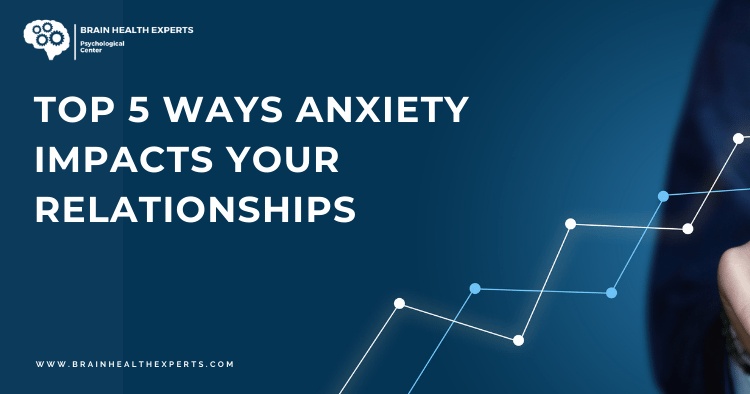Table of Contents
- Introduction
- 1. Communication Breakdowns
- 2. Increased Dependence or Withdrawal
- 3. Emotional Turbulence
- 4. Trust Issues
- 5. Difficulty with Intimacy
- Conclusion
- FAQs
Introduction
Anxiety can be a silent force that weaves itself through many aspects of our lives, particularly in our relationships. Whether you’re experiencing generalized anxiety, social anxiety, or specific phobias, the impact can ripple through your connections with friends, family, and romantic partners. Understanding these effects is the first step toward building healthier relationships. In this article, we’ll explore the top five ways anxiety impacts your relationships and offer insights on navigating these challenges.
1. Communication Breakdowns
Effective communication is the cornerstone of any healthy relationship, but anxiety can create barriers that lead to misunderstandings. Individuals suffering from anxiety may find it difficult to express their thoughts and feelings clearly. Here’s how anxiety can manifest in communication:
- Overthinking Responses: Anxious individuals often overanalyze what to say, fearing judgment or rejection. This can lead to delays in responding or vague answers.
- Avoidance of Difficult Conversations: Facing conflict can be daunting. Someone with anxiety might avoid important discussions altogether, which can leave issues unresolved.
- Misinterpretation: Anxiety can lead to heightened sensitivity, causing individuals to misinterpret their partner’s words or actions as negative or critical.
“Effective communication is not just about speaking; it’s about listening and understanding as well.”
Tips for Improvement
- Practice Active Listening: Ensure both partners feel heard. This involves paying full attention and responding thoughtfully.
- Set Aside Time for Conversations: Create a safe space for discussions, free from distractions.
For more tips on effective communication, check out 10 Tips to Overcome Negative Thought Patterns Today.
2. Increased Dependence or Withdrawal
Anxiety can cause individuals to either cling too tightly to their partners or withdraw emotionally. Both extremes can be detrimental to relationships:
- Increased Dependence: Some may rely excessively on their partners for reassurance, leading to feelings of suffocation. This can create resentment and fatigue in the relationship.
- Withdrawal: On the flip side, anxiety can cause people to isolate themselves. They may feel overwhelmed by their emotions and withdraw from social interactions, leaving their partners confused and hurt.
“Finding a balance between connection and independence is key to nurturing a healthy relationship.”
Finding Balance
- Open Dialogue: Discuss feelings of dependence or withdrawal openly to find a middle ground.
- Encourage Independence: Foster individual interests and friendships outside the relationship.
For resources on managing dependence in relationships, visit 10 Ways Positive Thinking Boosts Your Relationships.
3. Emotional Turbulence
Anxiety isn’t just a mental struggle; it can lead to emotional upheaval that can affect how we relate to others. This emotional turbulence can manifest in several ways:
- Mood Swings: Fluctuating emotions can lead to unpredictable behavior, making it hard for partners to feel secure.
- Overreactions: Small issues may trigger disproportionate responses due to heightened anxiety, leading to conflicts that seem out of place.
“Emotional stability is crucial for healthy interactions; understanding and managing anxiety can help achieve this.”
Strategies for Stability
- Mindfulness Practices: Engaging in mindfulness or meditation can help regulate emotions. For tips on mindfulness, check out 10 Mindfulness Practices to Reduce Stress Effectively.
- Therapy: Couples therapy can be invaluable for navigating emotional challenges together.
4. Trust Issues
Anxiety can breed insecurity, leading to trust issues that can undermine even the strongest relationships. When someone struggles with anxiety, they may:
- Question Loyalty: Constant worry about a partner’s feelings can lead to invasive thoughts, causing unnecessary jealousy or suspicion.
- Doubt Their Worth: Feelings of inadequacy can make individuals believe they aren’t deserving of love, leading to a cycle of mistrust.
“Trust is built on transparency and communication; addressing insecurities together can strengthen bonds.”
Building Trust
- Open Up: Share your feelings of insecurity with your partner. Vulnerability can strengthen bonds.
- Establish Transparency: Being open about social interactions and intentions can alleviate doubts.
For more on building trust in relationships, read 10 Ways Positive Thinking Boosts Emotional Well-Being.
5. Difficulty with Intimacy
Intimacy—both emotional and physical—is essential for a strong relationship but can be heavily impacted by anxiety. Here’s how:
- Fear of Vulnerability: Anxiety can make it hard to open up emotionally, hindering deep connections.
- Physical Intimacy Challenges: For some, anxiety can lead to avoidance of physical closeness, affecting sexual intimacy.
“Intimacy thrives in a safe environment where both partners feel secure to express their true selves.”
Improving Intimacy
- Create a Safe Space: Foster an environment where both partners feel comfortable expressing their needs.
- Seek Professional Help: A therapist can assist in addressing intimacy issues in a supportive setting.
For more insights on intimacy, explore 10 Effective Strategies to Enhance Workplace Mental Health.
Conclusion
Anxiety can profoundly impact relationships, creating challenges in communication, trust, dependency, emotional stability, and intimacy. However, by recognizing these patterns and actively working together, couples can navigate anxiety’s complexities to build stronger, healthier connections. Remember, it’s okay to seek help. Professional support can be a vital resource in overcoming these challenges.
FAQs
Q: Can anxiety be effectively managed in relationships?
A: Yes! With open communication, support, and sometimes professional help, couples can learn to manage anxiety together.
Q: Should I talk to my partner about my anxiety?
A: Absolutely. Being open about your feelings can help your partner understand your struggles and provide support.
Q: How can therapy help with anxiety in relationships?
A: Therapy can offer tools for better communication, emotional regulation, and coping strategies tailored to your unique situation.
If you have any more questions or concerns, feel free to reach out to a professional therapist or counselor for guidance!





